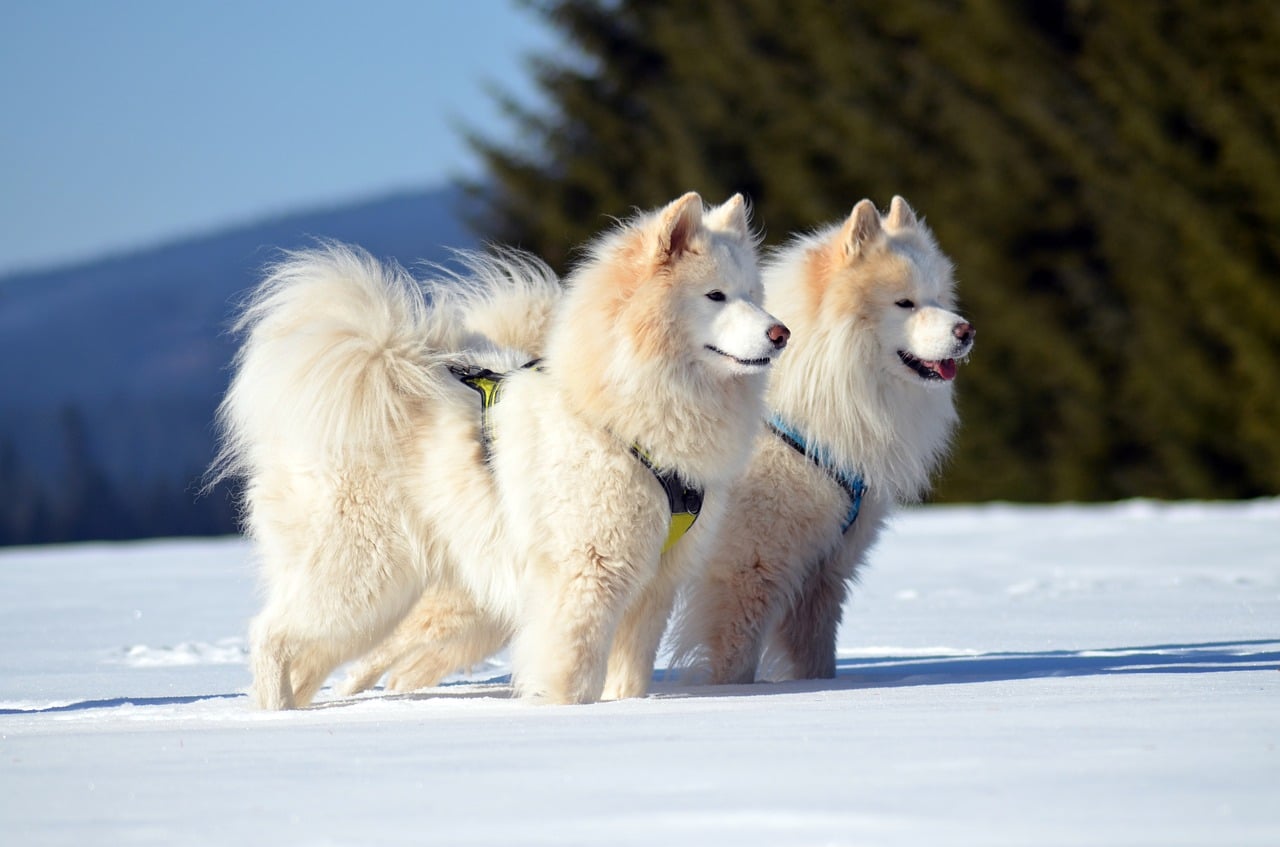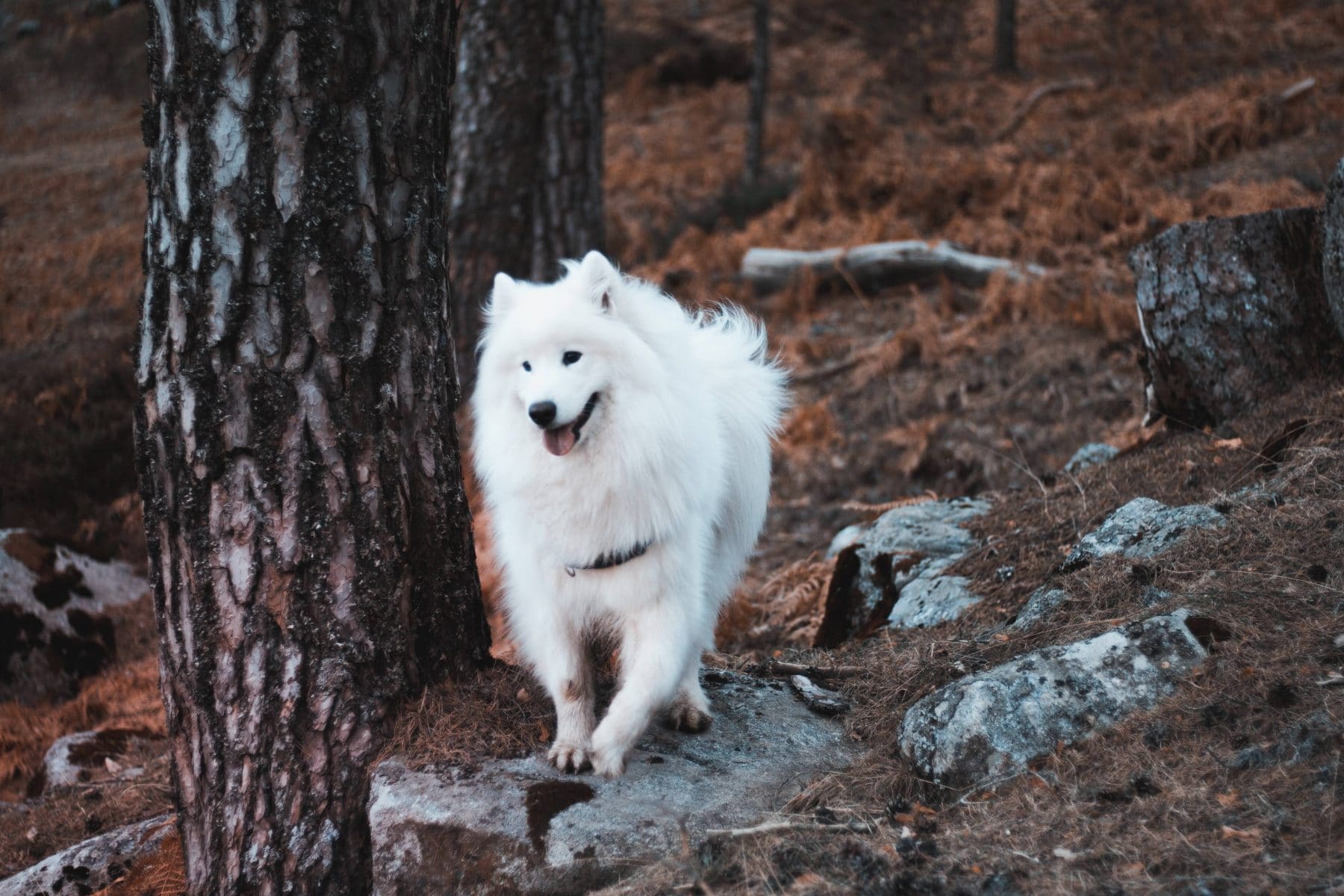With his permanent smile and personable disposition, the Samoyed puppy has secured a special place in the hearts of many dog lovers. We can’t get enough of that gorgeous, lush white coat!
Speaking of that thick coat—it’s more than just a fashion statement. It’s a trait that made it possible for this breed to work alongside its semi-nomadic people in brutally frigid temperatures. Impervious to the cold, Samoyeds fulfilled a number of roles for their owners: they worked as sled-dogs, watchdogs, and herd guardians.
The relationship between a Samoyed and his people ran deep—their very survival, in fact, depended on it. To keep warm, packs of Samoyeds huddled together with their humans in tents. Over time, Samoyeds developed a unique bond with their humans, a trait that continues to shine through today.
We don’t blame you if you’re charmed by the “Smiling Sammie.” But if you’re considering adopting one of these handsome pups, you need to know what you’re in for. We’ve done our research, so bookmark this guide as a handy Samoyed resource.
Samoyed puppy facts
This working dog of the arctic is stunning, to be sure. But what else should a prospective Samoyed owner know? We’ve gathered the most important highlights of this breed to help you make an educated decision about adding a Samoyed to your family.
Read on to learn what to expect from a Samoyed puppy.
| Size | Large. Samoyed males will reach a height of 21-23.5 inches, while females will usually be 12-21 inches tall.
Typically, males weigh 45-65 pounds, and females weigh 35-50 pounds. |
| Breed Characteristics | Samoyeds have a strong, muscular, and compact build. Their thick, white, double coat is instantly recognizable. They sport a plume-shaped tail that curves over their backside. The Samoyed’s “smiling” expression is another charming feature of the breed. |
| Temperament | Samoyeds are adaptable, friendly, and gentle dogs. The years they spent living so closely alongside humans created a breed that’s extremely loyal. Samoyeds are also self-reliant and independent. They’re smart, social, and occasionally mischievous. |
| Grooming and Health Needs | Take note: Samoyeds shed. A LOT. His coat needs frequent grooming. Samoyed owners will need to commit to brushing 2-3 times per week.
According to PetMD, Samoyeds sometimes suffer from progressive retinal atrophy and diabetes. |
| Training | The Samoyed is an intelligent and responsive dog. But he also has an independent streak, which can complicate training. Firm but loving training is best.
All those years spent as workings dogs have made a lasting impact on this breed—Samoyeds thrive when they have a job. Giving your Samoyed puppy regular tasks will keep him happy. |
| Energy Level | Samoyeds are agile and tireless. These dogs enjoy being active with their families. They require some daily exercise, such as a long walk or a friendly play session with you in the backyard. |
| Life Expectancy | You can expect a Samoyed to live between 12-14 years. |
Who is the best human for a Samoyed puppy?
The dignified Samoyed is a spirited and faithful pet, but he’s far from low-maintenance. This boisterous canine requires a significant amount of his human’s attention. Samoyeds need to be exercised daily, and their beautiful white coat needs frequent grooming. You should only consider getting a Samoyed if your schedule allows you to devote adequate time to both of those tasks.
Relying on each other for survival in the arctic, Samoyeds forged an incredible closeness with their nomadic masters. These dogs want to be near their owners, and they’ll demand your attention if they’re feeling ignored. An isolated Sammie is a miserable (and sometimes destructive!) Sammie.
Generally, a Samoyed puppy will get along well with other pets, including cats. They’re also good around young children, as long as you don’t mind when their herding instinct kicks in.
The ideal home for a Samoyed puppy is one that puts him to work—Samoyeds thrive when given a job. This can include retrieving the daily paper, jogging alongside his owner, or competing in agility courses.
There are some downsides to this breed. For one thing, Samoyeds have a tendency to roam if let loose. They can be stubborn during training and destructive when they’re bored. Excessive barking can also become a nuisance if the behavior isn’t addressed during puppyhood. Samoyed also love their humans, which can manifest into separation anxiety if you do not train and desensitize them early to being alone. These downsides can translate into high expenses too. Thanks to their tendency to be velcro-dogs, this pet parent spent over $10,000 on health, pet care, and training for her Samoyed puppy.
Getting a Samoyed puppy
The decision to adopt or to work with a breeder for your new Samoyed puppy is a personal choice that requires research. Thankfully, there are many resources out there to help you find a rescue or a breeder who offers healthy, ethically-sourced Samoyed puppies. Remember, however, the Samoyed is one of the most expensive breeds out there when it comes to expenses.
Adopting a Samoyed puppy
It may come as a surprise, but adopting a Samoyed puppy is possible. According to the AKC, most shelters report that the majority of their rescue dogs come from individual owner surrender due to a lifestyle change or an incompatibility with the dog. What this means for you: there may be many adoptable dogs and puppies out there who are looking for a new forever home.
The main difference between a breeder and a rescue is that a rescue may not always have young puppies to choose from. The benefit, however, is that most are mandated to only adopt out dogs that have been microchipped and spayed/neutered. This means you may end up with a dog who’s already been housebroken and doesn’t need these common medical procedures. You may also find a Samoyed mix that has all the traits you want from the breed, but with a little extra thrown in.
Finding a Samoyed rescue can be as simple as searching the internet. Check out the Samoyed Club of America—they offer tips for finding a reputable breeder and a breeder referral service.
Finding a Samoyed breeder
The first step is to do your research. Sadly, there are many puppy mills posing as reputable breeders along with many online scams. Be aware, and reach out to different online forums for conversations about getting your future furry family member.
Be sure to ask questions, and make arrangements to meet the parent dogs or mother. In the end, you must follow your gut. If something seems wrong at a breeder you visit, or the Samoyed puppy seems too good to be true, there’s probably something fishy going on. The AKC also offers resources for finding a breeder, with fairly strict guidelines on who they let participate.
Knowing what you’re in for when you get a Samoyed puppy is an important step in being a responsible pet owner. Whether you find an ethical breeder or are planning to adopt, prepare yourself for an affectionate and friendly addition to your household.
Samoyed puppy resources
After you find the right Samoyed puppy, it’s time to prepare your home! Here are a few resources to get you started.
- How to Survive the First 24 Hours with Your New Puppy
- How Long Can You Leave a Puppy Alone?
- How Often Should I Walk my Puppy?
- The Essential New Puppy Checklist
- The Best Pet Insurance: A Pet Parent’s Guide
- Puppy Training Resources
Featured image via Unsplash






